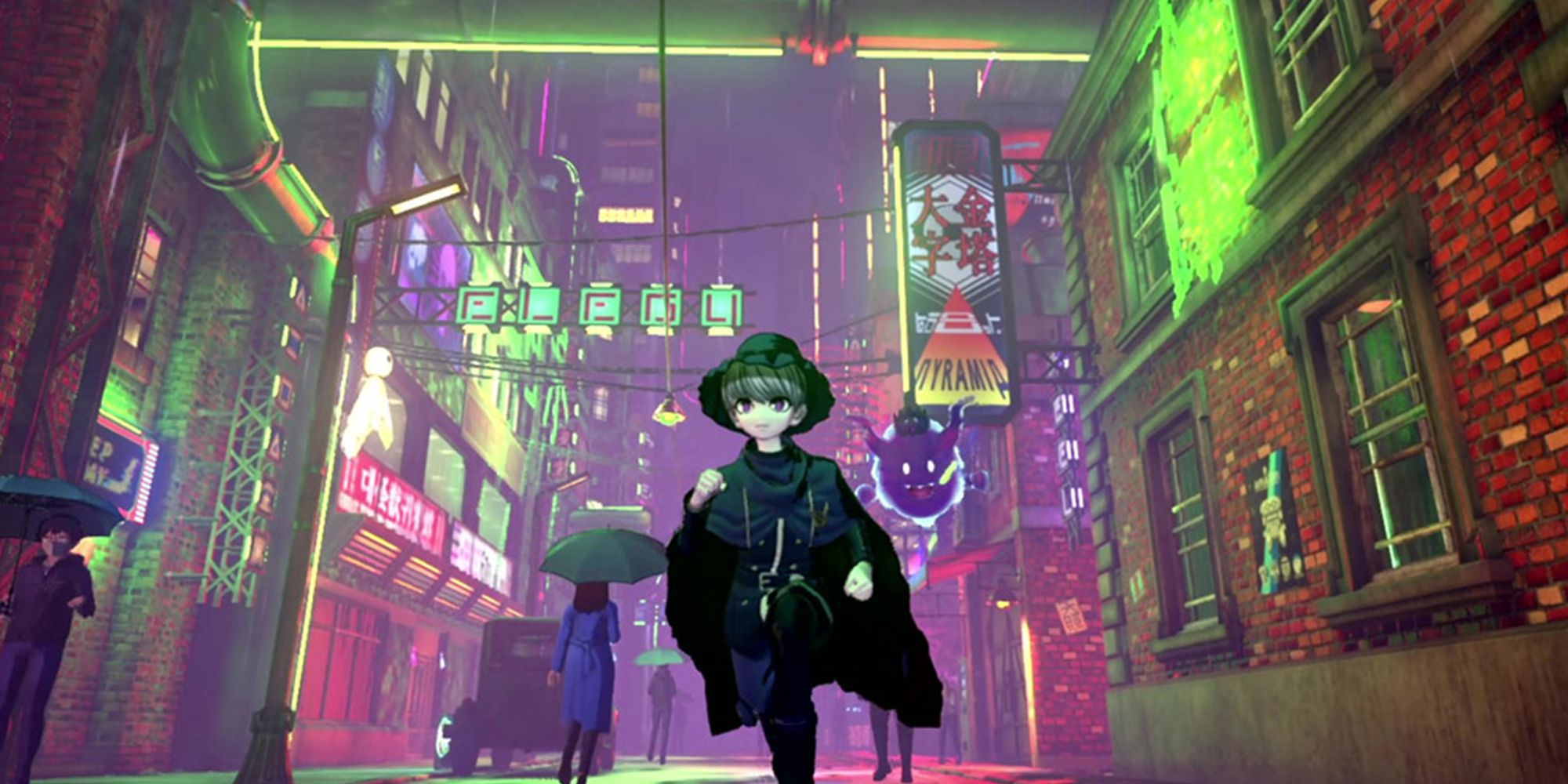Master Detective Archives: Rain Code
Nintendo Switch
A vividly arresting mystery adventure soaked in ambiance, personality, and a seemingly limitless imaginative streak. DualShockers was provided with a copy of the game for review purposes.
- Creative and compelling mystery adventure narrative
- Expressive characterization across all cast members
- Thematically dynamic gameplay
- Drenched in style and atmosphere
- 3D models are murky and unappealing
- Lip-synch issue at launch
When it rains, it pours, and here in Kanai Ward of Spike Chunsoft’s Master Detective Archives: RAIN CODE, it never stops pouring, for it never stops raining. Overhead, clouds blot out the sun. Underfoot, puddles splash against galoshes worn by the gumshoes who investigate the city—however covertly. Detectives are all but verboten in this city. Though some semblance of ‘order’ is ‘maintained’ via the brutality doled out by the Peacekeepers, Kanai Ward is a den of unfettered corruption in desperate, desperate need of justice—and in desperate need of detectives to uncover its knavery, its secrets, and its enigmas all.
A mystery adventure reportedly six whole years in the making, Rain Code is the first console release from Kazutaka Kodaka, Rui Komatsuzaki, and Masafumi Takada since 2017’s Danganronpa V3: Killing Harmony. Being the, ahem, masterminds behind the once-niche, now staggeringly popular Danganronpa franchise, Kodaka’s, Komatsuzaki’s, and Takada’s names are drenched with mystery adventure pedigree. You can imagine, then, that following the firm conclusion of the Danganronpa series, my expectations were sky-high for the mystery adventure these three were plotting next.
Unabashedly a mystery adventure in both practice and spirit, Rain Code takes brazen delight in pushing the genre as far into the realm of the magical as it can reasonably go. Taking place in the isolated city of Kanai Ward, where the rain never ceases and the crime never sleeps, Rain Code traces the story of one Yuma Kokohead’s search for truth and justice in a world seemingly devoid of both—all while nursing a severe case of amnesia, and grappling with being haunted by a deathly apparition named Shinigami. For Yuma, what begins as a determined quest for missing personhood swiftly spirals into a mystery-solving adventure on an almost fantastical scale.
Rain Code is divided book-like into several chapters, each of which spotlights a bizarre or gruesome mystery which it falls to Yuma, his fellow Master Detectives, and Shinigami to solve. While Kanai Ward does have a designated ‘peacekeeping’ task force, their ranks skew lazy and their superiors are supremely corrupted, the trickle-down effects of which are 1) cases being closed prematurely, and 2) otherwise innocent passers-by being falsely convicted out of convenience. So abysmal is the state of the law throughout Kanai Ward that in one case, I as Yuma had to reopen several grisly serial murders from months prior because exactly zero of these had been properly investigated by the Peacekeepers at the time.
From the massacre on the moving train, to the gunshot on the rooftop, the murder mysteries featured in Rain Code are distinct and intriguing in their method and setup, no doubt due to the creative freedoms afforded by such a complex setting as the city of Kanai Ward. Location and character fatigue are issues that have cropped up time and again in past mystery adventures of narrower scope—without comparing Rain Code to any of the mainline Danganronpa games, I do just want to point out that, not restricted to a tighter setting or smaller cast this time around, Kodaka’s mystery writing has never been so vivid and inventive as it is here.
Equally enrapturing is Rain Code’s mystery-solving gameplay. Being a hybrid visual novel with more emphasis on the ‘hybrid’ than the ‘visual novel’, the game doles out story and character not just through text-box dialogue, but through reactionary action scenes, on-foot exploration, and puzzles. As Yuma, I would debrief with the Chief of the Nocturnal Detective Agency in the morning, tamp around the city streets in search of information, before being plunged head-first into a Mystery Labyrinth where all the clues from my investigations were pieced together and the mystery was solved.
Kanai Ward may be a city of unending rain and gloom (punctuated with cyberpunk staples which I dare say will ping all too realistic in years to come), but the Mystery Labyrinths are where its surreal streak really kicks in, laughing brassily in the face of realism as it does so. Imaginatively, each of the Mystery Labyrinths is a distorted reflection of the mystery at hand. A case set in an all-girls academy, for example, ends up materializing as a labyrinthine school with twisting hallways, floating desks, and ephemeral feminine silhouettes fading in and out of view ahead and afore.
No two Labyrinths take the same form, nor do they ever follow the same sequence mechanically. Where one Labyrinth immediately threw me at a multiple-choice quiz (with possible answers presented as several doors), another began by locking me up in the caged pit of a Reasoning Death Match, with my opponent therein being a fantastically bellicose obstacle whose arguments I had to rebut before I could advance any further. Fundamentally, each Labyrinth is a different arrangement of quick-time events, multiple-choice questions, anagram puzzles, and Versus battles. Yet the constant reshuffling of these core mechanics, coupled with the ever-changing visual presentation, sufficiently suppressed any sense of repetition.
Unabashedly a mystery adventure in both practice and spirit, Master Detective Archives: RAIN CODE takes brazen delight in pushing the genre as far into the realm of the magical as it can reasonably go.
While Labyrinths can be solved with a dexterous hand and an equally dexterous imagination, there are a variety of assistive abilities you can unlock to aid you in your Labyrinth-solving as the game flows on. These skills can be unlocked in exchange for the rather appropriately-titled Skill Points (SP) that you gain as a result of puddling around the city, investigating various miscellany, and conquering the side-quests as they pop up throughout each chapter.
For the most part, Rain Code’s side-quests offer an engaging little distraction from the main plot. Taking on a side-quest, I’d be sent off to fetch an item, asked to conduct reconnaissance, or—in an especially memorable example—tasked with gently talking an acquaintance out of a shady deal with a suspicious wizard. Said acquaintance was a character whom I’d first met in an earlier case, and seeing their arc be elaborated and then concluded by this totally optional endeavor was immensely satisfying. Immensely rewarding, even, and not just because of the Detective Points it ended up netting me.
Between background characters such as Servant of the Church, side characters the likes of Makoto Kagutsuchi and the Chief, and the main attractions of Yuma and Shinigami, the overall cast of Master Detective Archives: RAIN CODE is dripping if not glistening with personality, charm, and complexity.There are no one-dimensional cardboard cutouts to be found here—rather, everyone is fully fleshed out to a compelling degree.
Take Desuhiko, for example. Despite his hotheaded overtures, this big-shorts guy ended up capturing my heart with his hilariously horny dialogue, his burgeoning camaraderie, and the surprisingly levelheaded attitude he would naturally take on when the situation turned serious or grave. Fubuki Clockford likewise endeared herself to me with her keen and determined nature. Though raised in isolation from society as the daughter of an influential family, Fubuki soon reveals that she wants to break away from her airy heiress reputation and instead prove herself worthy as her own person, on her own terms.
Fubuki, Desuhiko, and the majority of Rain Code’s dramatis personae appear both as profile sprites and cel-shaded 3D models throughout the game. The profile sprites, shimmeringly illustrated by Rui Komatsuzaki, often veer wildly and wonderfully between genial and exaggerated, affording each character just about every facial expression under the sun (rain?). I was less charmed by the cel-shaded 3D models, however. Though they were clearly intended to resemble Komatsuzaki’s style, the unfortunate majority of RAIN CODE’s 3D models had this gummy, clammy quality about them. It rendered them tacky at best and off-putting at worst.
It did not help the 3D models that their lip-syncing to the English voice acting was more often than not way, way off. There were several critical scenes whose pacing and impact were affected by the lapse between lip flap and voice over. The issue is apparently unique to the English voices, so anyone interested in experiencing the phenomenal vocal performances of such talent as Lucien Dodge, Anjali Kunapaneni, and Aleks Le might just need to keep in mind that these voices won’t always synch up super snappily. Spike Chunsoft is currently working to patch out this issue, but at the time of writing, it remains a constant throughout the game’s cutscenes.
Thankfully, this is the only flaw in Rain Code’s otherwise exquisite audiovisual presentation. Composer Masafumi Takada steeps Kanai Ward in a soundtrack of hazy synthesizers and droning bass lines. Fragmented piano notes fall like droplets of rain on the streets of Kanai Ward; the noise of neon, it’s music that makes the city beautiful in spite of its perpetual gloom. Investigation segments are given that private eye feeling by the jazzy off-the-street saxophone which plays throughout. The upbeat fresco of the Mystery Labyrinths, meanwhile, had my heart racing that much faster with the spirit of mystery adventure.
With an enthusiasm as endless as the downpour over Kanai Ward, Rain Code captures the truth of mystery-solving: that it is not so much a logic equation as it is an exercise for the imagination. Draw your outlandish theories as you would your finest sword. Press forth with an unflinching conviction regardless of what path lays ahead. There’s always adventure to be found in mystery, no matter how rainy it might be outside.
Stay connected with us on social media platform for instant update click here to join our Twitter, & Facebook
We are now on Telegram. Click here to join our channel (@TechiUpdate) and stay updated with the latest Technology headlines.
For all the latest Gaming News Click Here


